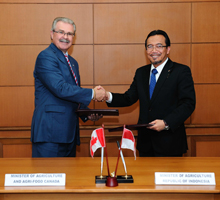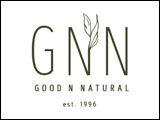
Minister Ritz and Indonesian Agriculture Minister Suswono after signing an agreement to improve cooperation between the two countries.
Agriculture Minister Gerry Ritz is in Japan at the first-ever Asia-Pacific Economic Cooperation (APEC) Agricultural Meeting working to strengthen trade relationships, expand market opportunities for farmers and create a more prosperous Canada.
“Recognizing the need for a safe and dependable food supply as the world population grows, we’re at APEC to drive a science-based approach to trade,” said Minister Ritz. “By promoting innovation, like biotechnology, Canada is looking forward to a future with stronger trade partnerships, a more sustainable environment and more profitable farmers, making sure that families around the world continue to have access to top quality food.”
Minister Ritz is taking full advantage of APEC by holding bilateral meetings with agriculture leaders from China, Mexico, and South Korea. Minister Ritz, together with provincial representatives from Canada’s New West Partnership, met with his Japanese counterpart Michihiko Kano and raised Canada’s long-standing request for greater access for Canadian beef. They also sat down with Japanese industry to discuss how to better help get Canadian products in the hands of Japanese consumers.
“We’re working at every level – provincial, federal and industry – to make sure countries like Japan and South Korea trade based on sound science and that our hard working beef producers achieve the full market access they deserve,” said Minister Ritz. “Our Government knows that if Canadian farmers have a level playing field they can compete and succeed, which in turn stimulates our economy, creates jobs and increases prosperity for all Canadians.”
In advance of APEC, Minister Ritz led a trade mission to Indonesia and received assurance from Agriculture Minister Suswono that Canada’s world-class system – which ensures that various plants such as wheat and potatoes destined for food are safe – will be fully recognized. This achievement is good news for farmers as it removes additional, costly and unnecessary testing at Indonesian ports. The Canadian Wheat Board anticipates that Canada’s wheat exports to Indonesia will be valued at more than $300 million this year.
Canada and Indonesia also signed an agreement to improve agriculture cooperation and focus on removing trade barriers to various Canadian products including seed potatoes, goat and sheep livestock and genetics, and cherries. Indonesia will enlist Canada’s animal health expertise to help build testing capacity in order to maintain a healthy cattle sector.
“We know Canadian farmers grow safe, high quality wheat and our Government is doing its part to make sure it can get to markets around the world without costly and unnecessary impediments,” said Minister Ritz. “By building closer partnerships we are better positioned to mitigate risks and drive a science-based approach to trade, helping dismantle trade barriers, brick by brick, clearing the way for safe, dependable and high quality Canadian products.”
Minister Ritz also made a stopover in Hong Kong to follow up Canada’s recovery of full market access for Canadian beef last December. Minister Ritz met with industry and was pleased to report that Canada’s beef exports to Hong Kong have significantly exceeded expectations. The Canadian Beef Export Federation originally expected the market to grow to $65 million but it is now expected to be worth more than $105 million for Canadian producers in 2010, a growth of 67 per cent since full market access was achieved.
This agriculture trade mission is part of Minister Ritz’s overall strategy to work with industry to strengthen Canada’s market share around the world, making sure that Canadian farmers can make their money from the marketplace and continue to drive Canada’s economy.



